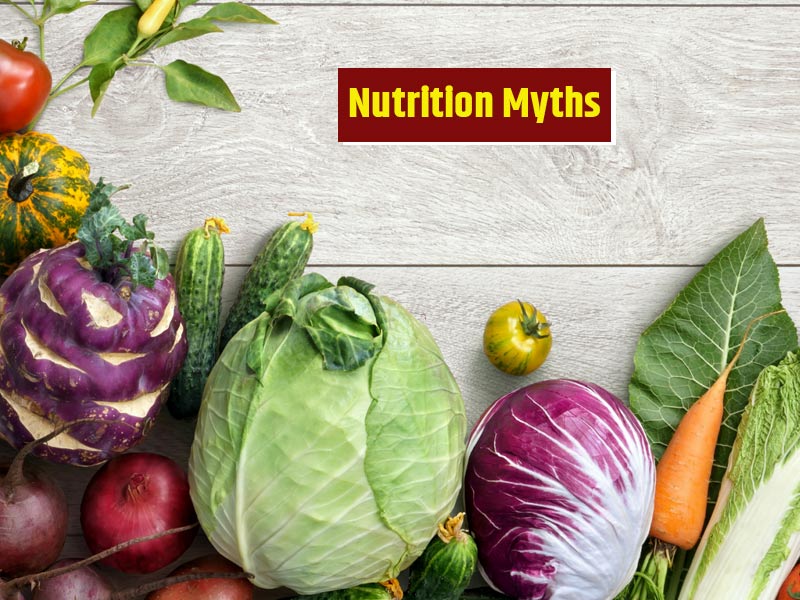
There exist a lot of Myths around Nutrition and healthy eating. Unfortunately, the internet is filled with misinformation, and it can be really difficult to identify evidence-based information comprising original research. Myths that were previously passed through word-of-mouth now spread like wildfire through social media, health blogs and other mediums. In this article, Dt. Naaznin Husein, Principal Coordinator: Nutrition and Dietetics, Esperer Nutrition shares 10 of the biggest myths related to nutrition, and why these antiquated beliefs need to be put to rest.
Table of Content:-
Myth: Intermittent fasting can help all!
Fact: Intermittent fasting is eating one or two meals in a day or fasting for a few. Appetite hormones and hunger centres in the brain go into overdrive when the body is deprived of meals, and there is a significant biological push to overeat during fasting periods.
People may even experience headaches, tiredness, crankiness, and constipation depending on how long they fast. Also engaging in unhealthy eating habits on non-fasting days becomes common. For individuals with diabetes, skipping meals and excessively reducing calories might be risky. Some people who take medications for blood pressure or heart disease also may be more prone to imbalances of sodium, potassium, and other minerals during longer-than-normal periods of fasting.
Also Read: Intermittent Fasting for Postpartum Weight Loss, Learn How Divya Harjai Is Doing It
Myth: Too much confusion on anti-inflammatory foods. What are they?
Fact: Natural anti-inflammatories are foods that can help reduce the chances of inflammation and swelling. If it is an inflammatory condition like allergy, asthma, autoimmune diseases, coeliac disease, glomerulonephritis, hepatitis, inflammatory bowel disease, changing the food habits may be beneficial. Some foods like berries, avocados, fatty fish, peppers, mushrooms and grapes are considered as anti-inflammatory foods.
Myth: Rock salt is a better choice than white salt!

Fact: The beloved sendha namak or rock salt holds special place in Ayurveda. This is known to aid stomach woes, treat cough & cold, improve skin health, among many more benefits. It is loaded with trace minerals but it has lesser sodium than table salt. Additionally, rock salt is not fortified with iron which means that if you swap table salt with rock salt, you may become iodine deficient.
Myth: Rice for a night meal makes us fat!
Fact: Rice is a staple in Indian cuisine. The quantity and quality of rice is what matters. A controlled amount of Brown Rice is beneficial as it contains a good amount of fibre that provides satiety and helps in slow release of glucose. On the other hand, refrigerating rice increases resistant starch that provides satiety, increases the glycaemic index and helps in slower release of glucose.
Also Read: Love Rice But On A Weight Loss? Try These 11 Rice Substitutes
Myth: Sugar is the only cause of Diabetes!
Fact: A diabetic individual needs to keep a check on the sugar and carbohydrate in the meals and properly manage blood sugar levels. However, if an individual is not diabetic, sugar intake will not cause the disease. In Fact the main risk factors for Type 2 diabetes are genetics, a diet high in calories, being overweight, and an inactive lifestyle.
Myth: Spinach is a very good source of iron!
Fact: There are two types of iron found in food; heme iron, which is found in animal foods, and non-heme iron, which is found in plants.100 gram of spinach has 1.14 mg of iron. It also contains a substance that binds to iron that hampers its absorption. Also an individual needs to consume large quantities of spinach in order to increase the iron stores in the body.

Myth: Eating a product labelled gluten-free is healthy!
Fact: Gluten-free is a trend in the world of nutrition, but it’s not for everyone. Those who follow a gluten-free diet even if they don’t suffer from celiac disease often feel better, because they’ve eliminated processed foods from the diet. Eating naturally gluten-free foods such as quinoa, sweet potatoes, and millet is good, but gluten-free processed food is not a healthy choice.
Also Read: Buckwheat Is The Best Gluten-Free Cereal, Know Buckwheat Health Benefits
Myth: Carbohydrates make us gain weight!
Fact: People fear that consuming Carbohydrates will cause obesity, diabetes, and other adverse health effects. In reality, eating a moderate amount of nutritious carbohydrates that are high in fiber, vitamins, and minerals like starchy root vegetables, grains, and legumes will benefit the health not harm it. Complex Carbohydrates provide satiety and slow release of glucose.
Myth: Eight glasses of water a day is the magic number!
Fact: Just like with nutrients and calories, basic hydration needs vary for each individual. How much water is required daily depends on the exercise and activity level, and even the temperature of an individual’s surroundings. Beverages like tea, coffee, soup, cucumbers and most fruits also contribute to water intake, but be mindful of added sugars, caffeine, and sodium.
Myth: Fruit juices are a healthy snack option!
Fact: Whole fruits are a better choice over fruit juices. Fruit juice is high in added sugars and to prepare one glass of fruit juice 3-4 fruits. Consuming too much sugar increases risk of many chronic diseases including heart disease and stroke. The best way to increase the fruit consumption is to eat whole fruit, which gives the added benefit of fibre that improves gut health.
Though these nutrition myths are likely here to stay, educating yourself by separating fact from fiction can help cultivate a nutritious and sustainable dietary pattern.
Image credits- freepik
Also watch this video
How we keep this article up to date:
We work with experts and keep a close eye on the latest in health and wellness. Whenever there is a new research or helpful information, we update our articles with accurate and useful advice.
Current Version